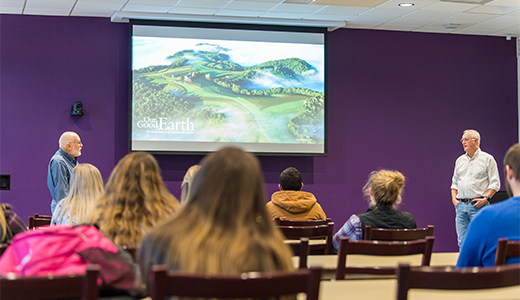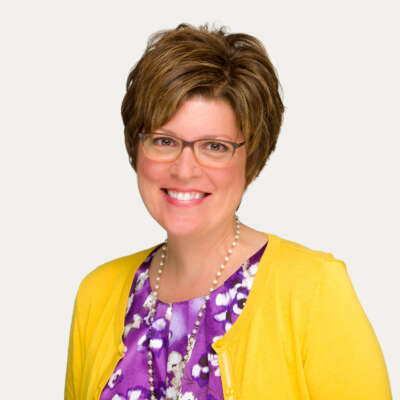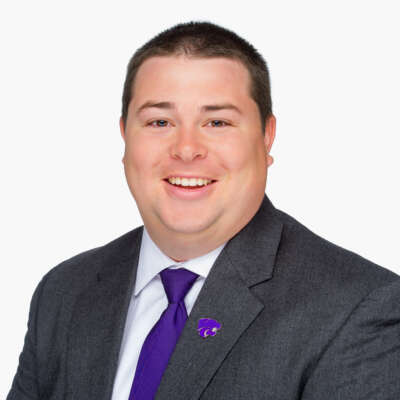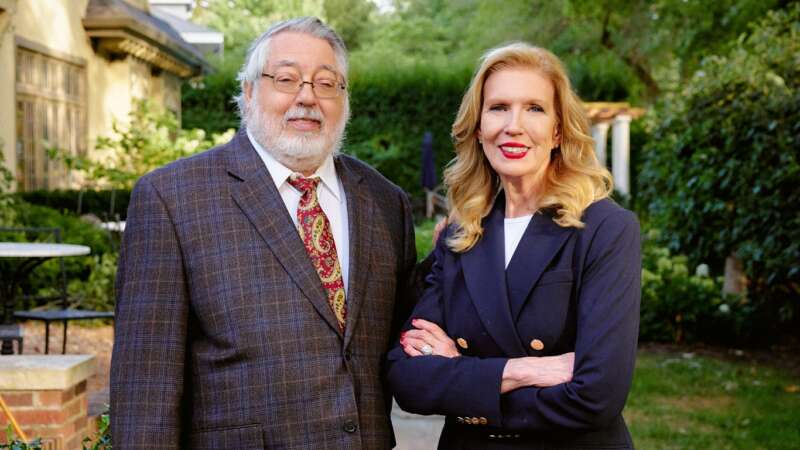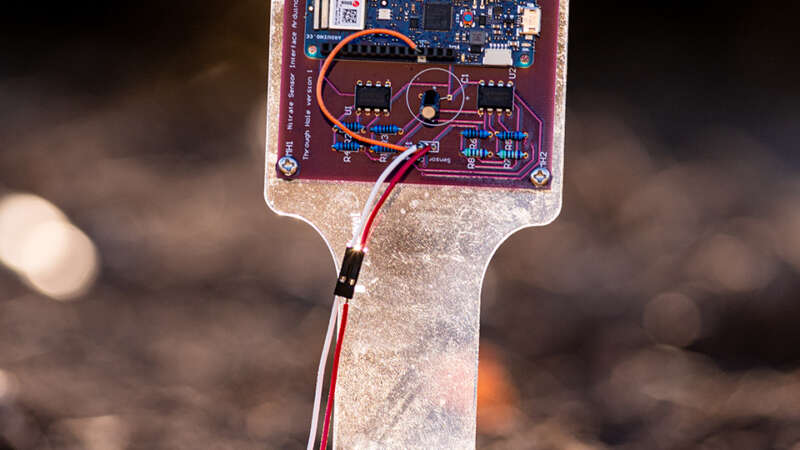The Henry C. Gardiner Global Food Systems Lecture Series promotes dialogue around complex issues.
Messages kept popping up on Dwane Roth’s phone, but they weren’t from his family or persistent marketers — they were from the soil water sensors on his farm in western Kansas.
Roth farms with his nephews near Holcomb, Kansas, using water from the Ogallala Aquifer to irrigate their land. For years, Roth thought he was doing a good job of using progressive water conservation techniques to reduce water usage, improve the soil and generally conserve the land.
Then he went to hear Jay Famiglietti, a hydrology scientist, give a lecture at Kansas State University.
Famiglietti was the fourth speaker invited to K-State through the Henry C. Gardiner Global Food Systems Lecture Series, which has been hosting world-renowned leaders in climate, agriculture and global foods research since 2013. Hearing Famiglietti talk about the depletion of underground water around the United States and the world, and the importance of reversing that trend to preserve water for future use, Roth doubled down on his conservation efforts.
“I knew we farmers had to do something to better conserve water,” Roth said. “I saw on the K-State website that this world-renown hydrologist, Jay Famiglietti, was coming to give a lecture, so I decided to go find out how to solve this problem. Before this, I said I would never spend $1,400 on a soil water monitor, but now I have them everywhere. I don’t even want to start an irrigation pivot if we don’t have one on there. That’s how this thing took off from the global food lecture.”
Since attending the Gardiner lecture in 2016, Roth has implemented technology that has cut down his water usage and improved the health of his soil. He has become passionate about preserving land and water for future generations, attending conferences around the country and inspiring the next generation of conservationists.
His daughter, Grace, focused on water advocacy and awareness as her FFA supervised agricultural experience project her freshman year in high school. This project grew into the Kansas Youth Water Advocates, which is supported by K-State, the Kansas Department of Agriculture, the state FFA office and other agricultural organizations.
The Henry C. Gardiner Global Food Systems Lecture Series began in 2013 as a way to honor a pioneer in livestock breeding and agriculture.
“My dad, Henry, was passionate about education and lifetime learning,” said Mark Gardiner, a 1983 K-State alumnus. “As a beef producer, he was never satisfied with average. Henry was committed to research and progressive dialogue with anyone sharing similar objectives. His theories weren’t always popular. He was committed to proving or disproving theories, recognizing that sustainable, repeatable results were the hoped for outcomes. He knew the pathway to progress was through objective dialogue, interaction with folks that didn’t always agree but were focused on the same end goal — to breed better beef cattle or to become better stewards of the land. Our goal with this lecture series is to sustain Henry’s philosophy of passionate learning that leads to better outcomes.”
Dwane and Grace Roths’ experiences demonstrate the impact the Gardiner lecture series is having in the community, but it is also benefiting faculty and students on the K-State campus.
The 2018 speaker, Sara Menker, is the founder and CEO of Gro Intelligence, a company that aims to find solutions to world hunger. It’s a technology company that provides data that helps farmers and others in the agricultural industry determine the most efficient way to grow food in different regions of the world. Because of her time speaking at K-State, Menker allowed students to use her expensive software free of charge.
“Gro Intelligence let the students use the site for free, which provided an exceptional opportunity for them to explore immense economic data sets on an incredible number of commodities from around the globe in a relatively easy to navigate platform,” said Ted Schroeder, professor of agricultural economics. “Access to Gro Intelligence helped the students become more aware of what types of data were available and in some cases provided access to data from international sources that they would likely have not found available elsewhere.”
Jida Wang, an associate professor in the Department of Geography and Geospatial Sciences focusing on hydrology, was able to connect and collaborate with Famiglietti, advancing his career in the process.
“I first learned about Jay Famiglietti while working on my doctorate at UCLA due to his pioneering work on groundwater issues, particularly using GRACE satellites,” Wang said. “When he came to K-State to give the Gardiner lecture, I was working with my colleagues on global endorheic (landlocked) water using GRACE satellites. I talked to him in person after the Gardiner lecture, and during our conversation, he agreed to collaborate in this work, which was eventually published in Nature Geoscience. Publishing with prominent researchers, with their contributions and endorsements, may increase the weight and credibility of my future research outputs, which is invaluable to early career scientists like me and my doctoral student who is a coauthor. It also brings prestige to K-State by elevating the profile and visibility of our research due to the global network and visibility of prominent researchers.”
Nearly every speaker has spent time with faculty and students, on top of giving the lecture. They visit classrooms and conduct workshops either the day of or after their speech. The lecture series also raises K-State’s prestige.
“The Gardiner lecture series puts us on the radar of someone like Sara Menker,” said Susan Metzger, associate director for agriculture and extension. “She probably never thought of K-State before, but now she will know who we are when conducting research or hiring someone. It puts us on people’s radar.”
The speakers selected for the lecture series often challenge conventional thought, creating debates between those who attend the lecture or watch it remotely; that is the purpose of the lecture series.
“Our overriding goal was to bring dialogue, discussion and honor to Kansas State University,” Gardiner said. “Ultimately, these events spur thought, thought spurs actions, which help us arrive at the ultimate goal of finding solutions to complex issues.”
Lecture series speakers
2023 Greg Doud, “The Future of Agricultural Trade, Geopolitics, and Food”
Gregg Doud, vice president of global situational awareness and chief economist at Aimpoint Research, as well as incoming CEO and president of the National Milk Producers Federation was the featured speaker for the 2023 Henry C. Gardiner Global Food Systems at K-State. Doud is a K-State alumnus who brings an unparalleled global perspective and economic expertise to the lecture series.
2022 Beth Ford, “The Future of Ag is Rooted in Tomorrow”
Beth Ford, the president and Chief Executive Officer of Land O’Lakes, Inc. was the featured speaker for the 2022 Henry C. Gardiner Global Food Systems at Kansas State University. One of the things Ford focused on throughout the talk was the future of food security.
2021 Frank Miltoehner, “Rethinking Methane: Animal Agriculture’s Path to Climate Neutrality”
Mitloehner is a sustainability expert who has spent nearly two decades studying the relationship between the livestock industry and air quality. He believes that better understanding of livestock emissions and mitigation processes and educating farmers and ranchers how to reduce their impacts can help reduce overall warming impacts and lead to the opposite: a cooling effect.
2019 Dennis Dimick, “Living in the Human Age”
Dimick is a journalist, photographer, presenter and educator. For years he served as executive environmental editor for National Geographic magazine and was a photo editor for the National Geographic Society for more than 35 years until retiring in December 2015. He continues in a consulting editorial role.
2018 Sara Menker, “Why There Doesn’t Need to Be a Global Food Crisis”
Menker is the founder and CEO of Gro Intelligence, a technology company that is bridging the information gap in agriculture by providing data that can help farmers and others in the agricultural industry determine the most efficient way to grow food in different regions around the world.
2017 Jason Clay, “Feeding the World, Sustaining the Planet”
Clay, senior vice president for markets and food at World Wildlife Fund, works with some of the world’s largest companies to reduce their impact on the environment. Clay created one of the first U.S. fair-trade ecolabels and has been involved in developing many other standards for commodities such as cotton, shrimp and sugarcane.
2016 Jay Famiglietti, “Water, Food, and Energy: Interwoven challenges to sustainable resource management”
At the time of his lecture, Famiglietti was the senior water scientist at the NASA Jet Propulsion Laboratory in Pasadena, California, and a professor of earth system science at the University of California, Irvine. He is now the director of the Global Institute for Water Security at the University of Saskatchewan in Saskatoon, Canada.
2015 Greg Page, “Climate Change and the Future of Food Production”
Since joining Cargill in 1974, Page has held numerous positions with the company in the United States and internationally, including a poultry processing operation in Thailand; beef and pork processing operations in Wichita, Kansas; and the financial markets group in Minneapolis. He served as Cargill’s chief executive officer from 2007 to 2013 and has been chair of the board of directors since 2007.
2015 Robb Fraley, “2050: Agriculture’s Role in Mitigating Global Challenges”
In 1983, Fraley and three other Monsanto scientists were the first to genetically modify plants. By 2013, Fraley’s work in this area contributed to crops that were being grown on more than 430 million acres around the world by 18 million farmers. More than 90% of the farmers are small, resource-poor farmers in developing countries. He was the 2013 World Food Prize recipient.
2013 Steve Hunt, “Meat and Meals”
Steve Hunt helped launch U.S. Premium Beef, which is a system that rewards ranchers and cattle feeders for producing quality beef. He served as its chief executive officer from 1996 through January 2013.
To support the Henry C. Gardiner Global Food Systems Lecture Series, give online at visit this link, fund D61040, or contact Kerry Wefald at kerryw@ksufoundation.org or 785-775-2090.
